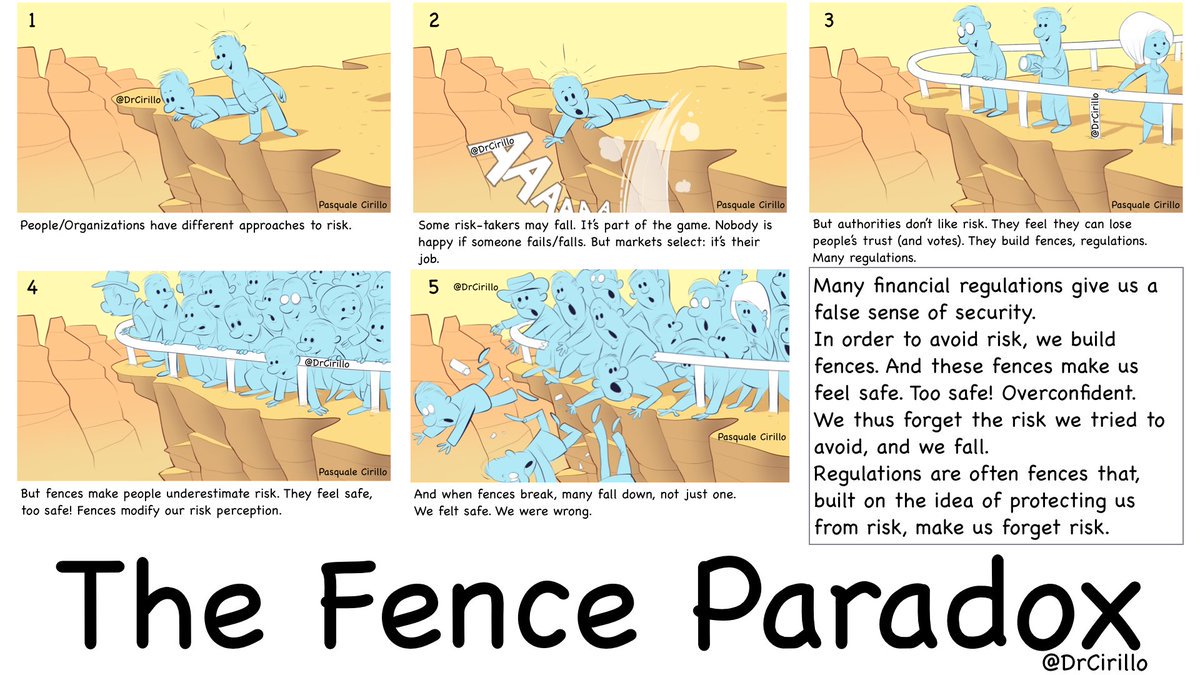
10 THESES ON EDUCATION:
1/ Higher education has been built around the needs of the universities, not of the students.
The fact that most bachelor/masters have the same duration regardless of the complexity of the underlying field is a demonstration of that.
1/ Higher education has been built around the needs of the universities, not of the students.
The fact that most bachelor/masters have the same duration regardless of the complexity of the underlying field is a demonstration of that.
2/ Teachers should be hired on the basis of how good they are to teach, not on how good they are at writing papers or at passing standardized tests.
3/ College students earn more because college selects smart kids, not because it makes them smarter.
Nassim Taleb calls this "lecturing birds how to fly".
Evidence: college bribes are only paid to get a kid in & never to pass exams.
Nassim Taleb calls this "lecturing birds how to fly".
Evidence: college bribes are only paid to get a kid in & never to pass exams.
https://twitter.com/Austen/status/1105859008877944832
4/ The fact that in many countries most college courses can be attended for free (only the exams & diplomas require fees) but no one does, is a great indicator of why people join the university & of the value it adds.
5/ The opportunity cost of universities is huge.
Just check how well most 4th year language studies students speak a foreign language compared to people who spent one year living abroad.
Just check how well most 4th year language studies students speak a foreign language compared to people who spent one year living abroad.
6/ Universities need Skin In The Game of their students. This includes forfeiting at least part of their tuition in exchange for a share of the future income of their students and/or recruiting fees from companies.
@LambdaSchool is an example of well aligned incentives.
@LambdaSchool is an example of well aligned incentives.
7/ Universities should not average data about future income of their students.
More granular data, with controls, is needed.
More granular data, with controls, is needed.
8/ Student loans must be limited in amount. Otherwise, they will only lead to higher fees & more student debt, till the inevitable default.
Like in the image below by @DrCirillo, the loans being the fence.
Like in the image below by @DrCirillo, the loans being the fence.

9/ Attendance to courses with limited employment possibilities should be limited.
Otherwise, we're wasting time and money to pass useless skills.
(Yes, they're useless, otherwise there would be employment.)
Otherwise, we're wasting time and money to pass useless skills.
(Yes, they're useless, otherwise there would be employment.)
10/ Experience is learnt, not taught.
Universities should become places of experimentation, or should abdicate to spaces of experimentation.
Students should be exposed to feedback from reality, not protected from it.
Universities should become places of experimentation, or should abdicate to spaces of experimentation.
Students should be exposed to feedback from reality, not protected from it.
11/ Papers produced by universities receiving public money should be available to the wide public for free, not hidden behind paywalls.
12/ As apparently it's ok to give teachers targets on the number of papers published, universities should give them targets that actually matter to students: employment of their pupils, for example.
13/ The most important matter, IMHO, is honesty about “who is university for”.
There is not a single answer. Probably, there should be many types of universities, one for each answer.
But each type of university should be fully transparent about who is it for & aligned to it.
There is not a single answer. Probably, there should be many types of universities, one for each answer.
But each type of university should be fully transparent about who is it for & aligned to it.
14/ In a measure, we confuse "growing up because of university" with "growing up while at university".
If university took place between the ages of 25-28, we would associate most of the benefits of university to whatever we did between 18 and 22.
If university took place between the ages of 25-28, we would associate most of the benefits of university to whatever we did between 18 and 22.
15/ I'm not saying "university is bad" or "university should only focus on the market's needs".
I'm saying "university has a heck of a cost, financial and of opportunity, both for the students and for the country, and we can do a lot better".
I'm saying "university has a heck of a cost, financial and of opportunity, both for the students and for the country, and we can do a lot better".
16/ Universities don't need to employ teachers who know their field immensely better than what their students are expected to at the end of the course.
Universities need teachers who know their field a bit better than their students but are incredibly good at teaching it.
Universities need teachers who know their field a bit better than their students but are incredibly good at teaching it.
17/ “Top-down teaching” (aka “I write on the blackboard and you copy it”) only works in fields where the future success of someone working in it can be predicted; ie survivorship bias is absent.
In other fields, other kinds of instruction are more appropriate.
In other fields, other kinds of instruction are more appropriate.
17/ “Top-down teaching” (aka “I write on the blackboard and you copy it”) only works for a given field in the measure that future success of someone working in it can be predicted; ie survivorship bias is absent.
In the measure it can’t, other kinds of education are preferred.
In the measure it can’t, other kinds of education are preferred.
• • •
Missing some Tweet in this thread? You can try to
force a refresh









